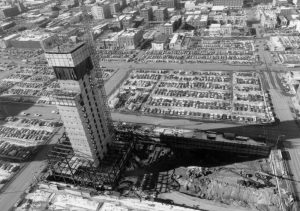Recently the Denver metro area has been experiencing unprecedented economic activity and growth, with hundreds of people moving here each month, new businesses coming to the area, and housing prices skyrocketing. How does this compare with the Denver of the 1970s?
In 1970, the Business School at the University of Colorado established the Denver Urban Observatory “to perform urban research.” Four years later they issued a major study, The Economic Base of Denver: Implications for Denver’s Fiscal Future and Administrative Policy. “A primary purpose of this research,” states the report, “is to provide the Denver Mayor with an appraisal of policy alternatives applicable to future regional development in the city and county.” Statistics and analysis on population growth, business and employment, taxation, land use, and housing prices provide insight on the city’s growth. (In 1970, the Denver metropolitan area’s median housing value was just $23,058!). The report also examines the process of attracting and locating industry in Denver — once again a hot topic.
The findings of the 1974 study can teach us some valuable lessons and provide perspective on the economic development of Denver in the past, today, and in the future. The study authors conclude that “in the final analysis the city does have a choice, however. It can govern the city more or less passively letting private market forces largely determine its socio-economic and financial fate. Or it can govern actively, using the policy tools at its disposal to shape and form the economic base to conform to its view of what the city should be.” This report is an excellent resource for policymakers, economists, and journalists to use in researching the history of Denver’s growth and economic development.

- How to Spot the Differences Between Eagles and Hawks - August 16, 2021
- How Transportation Projects Help Tell the Story of Colorado’s Past - August 9, 2021
- Time Machine Tuesday: The Night the Castlewood Canyon Dam Gave Way - August 3, 2021